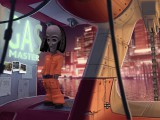 The Journey Down: Over the Edge, 2010’s surprise freeware hit from SkyGoblin’s Theodor Waern returns in all-new commercial form! The ex-Adventure Game Studio title now flaunts its own in-house engine, new puzzles and locations, higher-resolution art and all-new 3D-animated characters and voice acting! In addition to being released on the PC and Mac at GamersGate, Linux, Android and iOS ports are also to arrive shortly.
The Journey Down: Over the Edge, 2010’s surprise freeware hit from SkyGoblin’s Theodor Waern returns in all-new commercial form! The ex-Adventure Game Studio title now flaunts its own in-house engine, new puzzles and locations, higher-resolution art and all-new 3D-animated characters and voice acting! In addition to being released on the PC and Mac at GamersGate, Linux, Android and iOS ports are also to arrive shortly.
The new The Journey Down: Chapter One, then, is the first part of an episodic adventure series in the Monkey Island–Full Throttle–Grim Fandango mode – as good a trinity of influences as any! The game tells the story of Bwana and Kito, two adopted brothers, who have been left in charge of captain Kaonandodo’s “Gas and Charter” enterprise ever since his sudden disappearance. The brothers are however left hanging high and dry after the mysterious Armando Power Company initiates a dastardly money grab – just as a damsel in distress appears knocking on the brothers’ proverbial door!
 The original indie release was a critical hit. “Over the Edge” was one of the – if not the – best medium-length indie adventures of 2010. I personally thought as much. Two years after the fact, however, reviewing the all-new remake, seems oddly unfair as well as difficult: What was the feature, exactly, that made the original so very enjoyable, and more importantly, how to once again accurately convey it?
The original indie release was a critical hit. “Over the Edge” was one of the – if not the – best medium-length indie adventures of 2010. I personally thought as much. Two years after the fact, however, reviewing the all-new remake, seems oddly unfair as well as difficult: What was the feature, exactly, that made the original so very enjoyable, and more importantly, how to once again accurately convey it?
Was it the game’s wistful nostalgia combined with surprisingly effective comedic relief, or the “Fandango”-like injection of the African Chokwe/Makonde masks that so successfully gave the game its unique touch? Or the stirringly sharp hand-painted 2D backgrounds? Or the expert pacing and flow? The carefully-crafted, balanced puzzle-solving? The jokes?
Looking back, in my original review, I did claim The Journey Down’s primary feature to be its visual direction. This fact should be altogether apparent just from screenshots alone, however, which makes me want to revise my previous statement, instead focusing on the one thing every prospective Journeyman and -woman should know: (more…)
Read More


